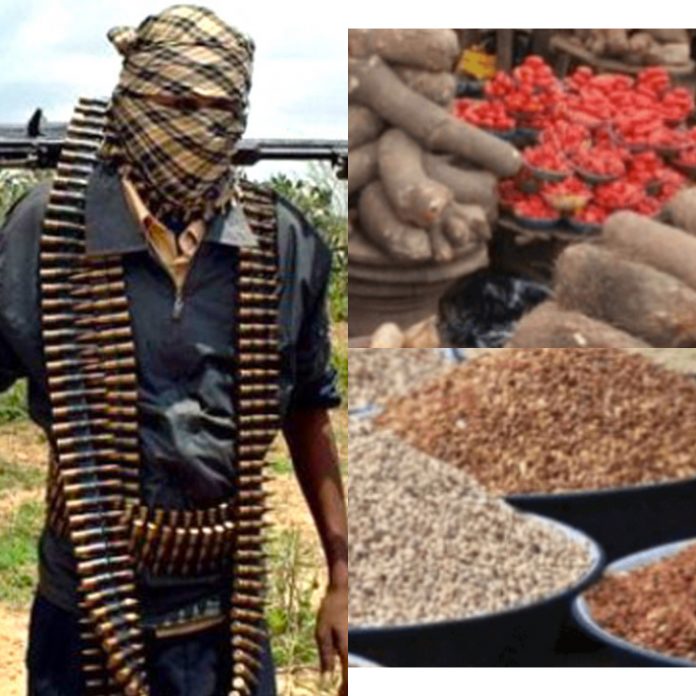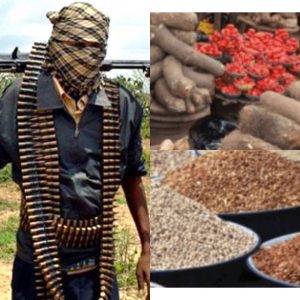A terrorist, foodstuffs
Since the beginning of the Fourth Republic in 1999, it is no longer news that the country has been experiencing an unprecedented level of insecurity in a way hitherto never seen before. Beginning in part from the administrations of Goodluck Jonathan and Muhammadu Buhari. While the terrorist group known as Boko Haram had been challenged national peace during the former’s tenure, criminal bandits further worsened the nation’s security under the latter’s time in office. According to informed data from the Nigeria Security Tracker, the estimated number of fatalities during the tenure of Buhari was 63,111. In his first year in office, Tinubu has underperformed in the area of security, he fell short of strengthening the nation’s security, despite his assurances to the contrary.
The SBM Intelligence platform has given a damning report that approximately 5,000 Nigerians were murdered and 7,000 kidnapped during President
Tinubu’s first year of office.
The deadly Niger State ambush and aircraft accident that occurred on 14 August, 2023, just a few months after President Tinubu’s inuaguration, also claimed the lives of no less than 36 soldiers. Under Tinubu, insecurity has remained a bugbear, a fundamental challenge that has persisted in plaguing the Nigerian state. The country is beset by banditry in the North-West, the Boko Haram insurgency in the North-East, the attacks of Fulani herdsmen, and militancy in the Niger Delta.Informed analysts are of the view that the Tinubu administration is incrementally making a significant contribution to a decline in national security. Professor Adeagbo Moritiwon a political scientist said “the administration economic policies which have further pauperised the citizens have in no small way driven the people further a field, making them up their criminal game. An hungry is an angry man, sociologists teach us that those category of people are ready to break the law and subvert societal values.”Dr. Abiobio Ligalu, a sociologist said unwittingly” this administration has contributed to a swell in crimes as a result of widening the gulf between the rich and the poor, it’s of account that Tinubu has
finished the business of wiping out the middle class. I often wonder how our leaders think, and what kind of thinking goes on in their mind.”He said “A sense of insecurity within a nation frequently results in an increased sense of suspicion towards outsiders and even fellow citizens, which may cause social divisions. A nation engulfed in insecurity may lose investors and investments due to potential economic stability. The propensity of individuals to be business-oriented or even pursue educational opportunities may be diminished, thereby impeding the nation’s overall development. And in this milieu, crime, kidnappings and banditry increase, as the criminal- minded individuals seek ways to make money outside of the law.”Ironically, when Bola Ahmed Tinubu was sworn into office as the President of Nigeria on May 29, 2023, he promised to end the insecurity that had almost brought the country to its knees.Though it’s true that before he assumed leadership of the country, Nigeria had witnessed seemingly unrestricted killings by non-state actors, so Nigerians anxiously waited to see how his government would tackle the massive security challenges that bedevilled the country over the past
few years.Tinubu promised to tackle insecurityIn June 2022, when he emerged as the All Progressives Congress (APC) presidential candidate for the 2023 general elections, he promised a secure, prosperous, and united Nigeria in his victory speech.Tinubu said he was ready to provide security and rebuild the economy. He said if elected president, he would eliminate criminals, including terrorists.Also, during his campaign tours, Tinubu promised to tackle the security situation across the country, stating that the economy cannot thrive in an insecure environment.He said, “I used the same approach to tackle the bad security situation that faced me when I became governor of Lagos. I created programmes and institutions to solve the real and dangerous challenges Lagos faced.“I shall increase security personnel and better equip them. Advanced air and ground surveillance technology will identify, track and attack the criminals until they are utterly defeated,” the former
governor of Lagos state said.Still on security, in his inaugural speech on May 29, he pledged to prioritise security and effectively tackle the menace of insecurity.“Security shall be the top priority of our administration because neither prosperity nor justice can prevail amidst insecurity and violence.“To effectively tackle this menace, we shall reform our security Doctrine and its Architecture.“We shall invest more in our security personnel, and this means more than an increase in number. We shall provide better training, equipment, pay and firepower,” Tinubu stated.Data speaks despite the promises made by Tinubu on security, data from various sources showed that the security situation has little or no change under his administration, as over 600 people were killed under him within 45 days.
Data from SBM Intelligence, an analysis platform, revealed that about 629 Nigerians were killed within 45 days across the country under President Tinubu between May 29 and July 13, 2023.According to data, the killings happened primarily from activities of non-state actors like bandits, Boko Haram insurgents, ethnic militias, armed robbers and other non-state actors.Other data from the Council on Foreign Relations’ Nigeria Security Tracker (NST) and media reports checked by National Waves revealed that non-state actors killed 587 people within the same period.A report by a civil society organisation, Global Rights Nigeria, revealed that at least 555 people had been killed and 267 others abducted six weeks after President Tinubu took office.Also, in a report published on June 14, Amnesty International (AI) said more than 120 people were killed a few days after Tinubu assumed power.At least 2,336 people were killed in various violent attacks within the first three months of 2024,
according to data sourced and analysed by The ICIR.This is an approximate average of 26 persons killed daily between January 2024 and the end of March 2024.Many Nigerians have expressed disappointment at the failure of the Tinubu administration to end banditry.In January, following a surge in kidnapping cases, a former Vice President of Nigeria, Atiku Abubakar, sent cautionary advice to Tinubu to resign if he could not handle the insecurity challenges currently bedevilling Nigeria.Atiku, who contested the last presidential election against Tinubu on the platform of the Peoples Democratic Party (PDP), said this in a post on his X handle on Tuesday, January 30.He accused the President of being a fiddler when the nation was insecure.On Monday, January 29, civil society organisations (CSOs) in Nigeria appealed to Tinubu to declare an emergency due to the nation’s insecurity.
On March 14, 2024, four officers and 13 soldiers were murdered in Okuama, Delta State.The officers were said to have been killed by some youths while the troops were on a peace mission to the Okuoma community in Bomadi Local Government Area (LGA).”Ever since he removed subsidy on his inauguration day, prices of food and basic commodities have reached unprecedented levels never seen before in the country, causing great hardship, hunger and extreme deprivation, while the politicians live in conspicuous consumption and luxury. In the midst of this unprecedented suffering, the administration continues to tell Nigerians to bear the suffering promising Eldorado of unclear , uncertain future, in yet another deception of the citizens. While asking Nigerians to bear the heat of his economic policies, and to make sacrifices, the National Assembly members running into over 460 bought a SUV costing N160 m each”, Rachael Bitiyong, a political science undergraduate told NATIONAL WAVES.
Since taking office in May last year, Tinubu has implemented reforms including slashing fuel and
electricity subsidies and devaluing the naira currency twice to try to increase investment and boost output. He says the policies are necessary to put Nigeria on a long-term growth path. But the economy is growing well short of the 6% annual expansion targeted by Tinubu, while the reforms have driven inflation to a 28-year high, worsening a cost-of-living crisis. Analysts say economic hardship is also fuelling crime which in turn is hurting people’s livelihoods.Bismarck Rewane, a prominent economic analyst who was appointed to Tinubu’s economic council in March, agreed with the need for economic reforms but said more attention should have been paid to their implementation.”The reforms came too quickly but there was no concrete plan to deal with the impact these reforms would have on the people,” he said.
Basic commodities are beyond the reach of ordinary citizens. A single yam which used to go for N800 before Tinubu’s administration is now N5000, while a bag of rice hovers around N80,000, while a bag of beans nestles N85,000, while tomatoes are beyond the reach of citizens. A basket of tomatoes which went for N15,000 before is now N100,000. Chicken that
used to go for N2300 is now N5500, making it impossible for a family of four not to spend more than N10,000 to prepare a soup.Apart from the prevailing political crises, we are confronted with numerous economic difficulties stemming from the persistent devaluation of our legal tender and the daily inflation of the prices of goods and services provided within the nation.
Amidst these circumstances, President Bola Ahmed Tinubu abruptly announced the removal of the fuel subsidy on 29 May, 2023. However, following the president’s inauguration, the prices of food, transportation, and other essentials skyrocketed in no time. Currently, the prevalent issues in the country encompass starvation, malnutrition, and the struggle for survival among Nigeria’s middle-income earners. The naira has lost redeemability because of the exchange rate deterioration, and an average Nigerian can barely afford to eat a meal a day. Several challenging decisions, including the elimination of petroleum subsidy, contributed to these results, which make many people question whether the removal of subsidy was a necessary sacrifice to exonerate an unstable system or a
deliberate attempt to punish Nigerians. In Nigeria, fuel subsidy has historically exhibited ambivalent characteristics. According to some critics, its elimination was intended to alleviate the government’s financial burden and foster economic expansion. To the contrary, it has inadvertently caused a cascade of increases in the cost of living. An immediate example is the significant increase in fuel expenses, which has a direct repercussion on transportation expenditures and, consequently, the costs of goods and services. Transportation plays a vital role in facilitating economic activities in Nigeria, as most citizens extensively utilise it for their daily commuting needs. Transportation expenses escalate in tandem with petroleum costs, leading to a consequential surge in the prices of essential commodities.This has affected numerous citizens, especially individuals with low incomes, who devote a substantial proportion of their earnings to necessities. Since inflation undermines the ability of people to afford their fundamental necessities by eroding their purchasing power, middle- and lower-class populations are disproportionately affected by this circumstance, which exacerbates pre-existing socioeconomic inequalities.


